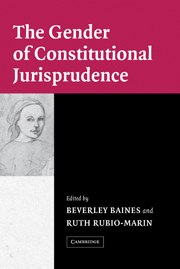Book contents
- Frontmatter
- Contents
- List of Contributors
- Acknowledgments
- The Gender of Constitutional Jurisprudence
- Introduction: Toward a Feminist Constitutional Agenda
- 1 Speaking into a Silence: Embedded Constitutionalism, the Australian Constitution, and the Rights of Women
- 2 Using the Canadian Charter of Rights and Freedoms to Constitute Women
- 3 Emancipatory Equality: Gender Jurisprudence under the Colombian Constitution
- 4 Gender Equality and International Human Rights in Costa Rican Constitutional Jurisprudence
- 5 Constituting Women: The French Ways
- 6 Gender in the German Constitution
- 7 India, Sex Equality, and Constitutional Law
- 8 Constitutional Transformation, Gender Equality, and Religious/National Conflict in Israel: Tentative Progress through the Obstacle Course
- 9 “No Nation Can Be Free When One Half of It Is Enslaved”: Constitutional Equality for Women in South Africa
- 10 Engendering the Constitution: The Spanish Experience
- 11 Gender Equality from a Constitutional Perspective: The Case of Turkey
- 12 Gender and the United States Constitution: Equal Protection, Privacy, and Federalism
- Index
Introduction: Toward a Feminist Constitutional Agenda
Published online by Cambridge University Press: 14 January 2010
- Frontmatter
- Contents
- List of Contributors
- Acknowledgments
- The Gender of Constitutional Jurisprudence
- Introduction: Toward a Feminist Constitutional Agenda
- 1 Speaking into a Silence: Embedded Constitutionalism, the Australian Constitution, and the Rights of Women
- 2 Using the Canadian Charter of Rights and Freedoms to Constitute Women
- 3 Emancipatory Equality: Gender Jurisprudence under the Colombian Constitution
- 4 Gender Equality and International Human Rights in Costa Rican Constitutional Jurisprudence
- 5 Constituting Women: The French Ways
- 6 Gender in the German Constitution
- 7 India, Sex Equality, and Constitutional Law
- 8 Constitutional Transformation, Gender Equality, and Religious/National Conflict in Israel: Tentative Progress through the Obstacle Course
- 9 “No Nation Can Be Free When One Half of It Is Enslaved”: Constitutional Equality for Women in South Africa
- 10 Engendering the Constitution: The Spanish Experience
- 11 Gender Equality from a Constitutional Perspective: The Case of Turkey
- 12 Gender and the United States Constitution: Equal Protection, Privacy, and Federalism
- Index
Summary
Women around the world increasingly resort to constitutional litigation to resolve controversies involving gender issues. This litigation has involved claims for political participation, freedom from discrimination and violence, sexual and reproductive rights, employment and civic rights, matrimonial and familial autonomy, as well as other social and economic rights. For the most part, constitutional law scholars have analyzed this jurisprudence doctrinally, confining their research mainly to individual flashpoint issues such as abortion or affirmative action. Such studies are usually framed by national boundaries; and, when comparative, their reach is often limited to a small number of countries sharing the same legal tradition. This explains the need for a feminist analysis of constitutional jurisprudence in which gender becomes the focal point and for a broader comparative constitutional law approach that encompasses both of the world's major legal traditions. Those are the focal points of this book.
Not long ago a feminist constitutional law scholar asked: “Can constitutions be for women too”? Cognizant of the dangers of overgeneralizing about women's experiences and concerns, she was cautious about responding affirmatively. Nevertheless, her message was clear. Although women may be un-, or under-, represented among the ranks of those who draft domestic constitutions, we are not entirely without constitutional agency. Whether constitutional language adverts or not to women, we still advance claims for constitutional rights.
- Type
- Chapter
- Information
- The Gender of Constitutional Jurisprudence , pp. 1 - 21Publisher: Cambridge University PressPrint publication year: 2004
- 1
- Cited by

